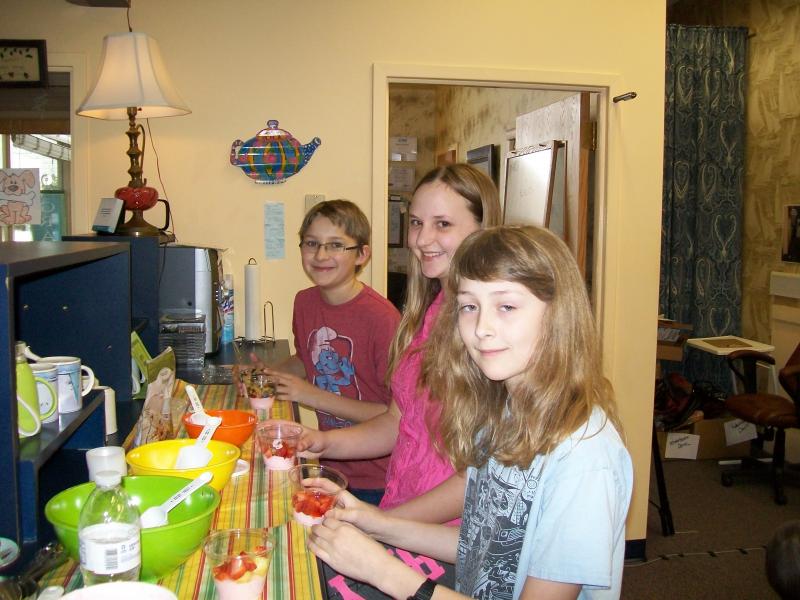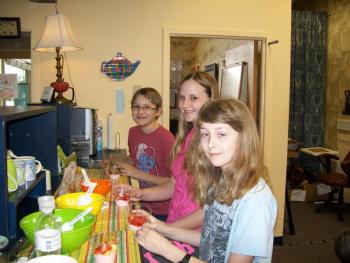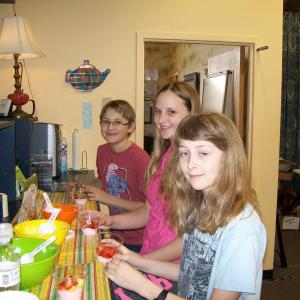Routines and antecedents: Set yourself and your kids up for success
 Red Cross Certified Babysitters preparing a healthy snack. From left, Isaac Wyer, Emily Echols and Grace Campbell provide the free onsite babysitting during Parent Support Group meetings along with adult volunteers (not pictured) Jane Good, Erin Barter, Christina Barter and Kim Burnham. Courtesy photo
Red Cross Certified Babysitters preparing a healthy snack. From left, Isaac Wyer, Emily Echols and Grace Campbell provide the free onsite babysitting during Parent Support Group meetings along with adult volunteers (not pictured) Jane Good, Erin Barter, Christina Barter and Kim Burnham. Courtesy photo
 Red Cross Certified Babysitters preparing a healthy snack. From left, Isaac Wyer, Emily Echols and Grace Campbell provide the free onsite babysitting during Parent Support Group meetings along with adult volunteers (not pictured) Jane Good, Erin Barter, Christina Barter and Kim Burnham. Courtesy photo
Red Cross Certified Babysitters preparing a healthy snack. From left, Isaac Wyer, Emily Echols and Grace Campbell provide the free onsite babysitting during Parent Support Group meetings along with adult volunteers (not pictured) Jane Good, Erin Barter, Christina Barter and Kim Burnham. Courtesy photo
This is the fourth in a series of articles on the 5 Rs of Positive Discipline. This, among other topics, is being discussed by local parents at the Parent Support Group taking place every other Saturday through May 13, 2017 at the Community Center in the Meadow Mall. Free onsite babysitting is provided by volunteers and Red Cross Certified sitters so that parents can relax and focus during the 2-hour meeting.
The first three articles addressed Reinforce, Respect and Redirection. This time we’ll review the 4th of the 5 Rs of Positive Discipline: Routines. The 5 Rs is an approach to discipline that seeks to avoid and change problem behavior without using punishment, and by teaching appropriate ways to behave.
An established family routine provides the antecedent to cooperative behavior. So we need to talk about antecedents and the ABC’s of behavior before getting into routines. When analyzing behavior we look at A - the antecedent, or what is happening immediately before the behavior, B — the behavior, and C — the consequence, or what happens immediately after the behavior (a huge topic for another time perhaps).
When you ask your child to do something, that is a prompt. The prompt is an antecedent to how they respond. Therefore, how you prompt will make it more or less likely the behavior happens.
Alan E. Kazdin, Director of the Yale Parenting Center and Child Conduct Clinic recommends in “The Kazdin Method for Parenting the Defiant Child” the following tips for more effective prompting:
- Begin with “Please”
- Use a warm and gentle tone.
- Be clear and specific about what you want them to do. E.g. “Please pick up all your dirty clothes and put them in the laundry basket.”
- Get close instead of yelling from across the room
- Follow up with descriptive praise such as “I see you put all your dirty clothes in the laundry. It’s a pleasure to walk into your room.” Be enthusiastic and genuine (no problem there because you’ll likely be thrilled).
Those are the “do’s’” of effective prompting. Now the “don’t” which is key is - don’t state the prompt in the form of a question such as “Would you go get ready for bed?” or “Can you please do the dishes?” This leaves room for a “no” response, which you probably don’t want. Many of us do this and it's a hard habit to break. It requires a conscious effort and practice.
There are two kinds of antecedents over which you have control:
- The first is the prompt – discussed above.
- The second is the routine – It is not specific to the behavior, but it is a ritual that helps set the stage for it.
A routine is anything you do around the same time with regularity. It can be as simple as getting up at the same time every morning, washing hands before a meal, or as structured as a chore schedule for your kids.
Why family routines are important:
- The quality of family life and relationships is greatly influenced by rituals and routines.
- The research shows that regular family activities help to reduce stress and anxiety among children.
- Routines help to improve and maintain positive interactions and cooperation.
It is the predictability of routines that is comforting. When we know what to expect from someone or a situation we feel more at ease and in a “better mood” and therefore behave better. We all like to know that we have some control over how things are going to go. And kids are more likely to follow through on household tasks if it is a regular routine that is expected, rather than a demand that is made of them when you are at your wit’s end and they are in the middle of playing a video game.
Developing routines:
1. Involve your children in developing the routines. They will buy into it more if they helped to come up with it.
2. Pick a time of the day or situation that causes stress and uncooperative behavior in your household.
3. Back track to figure out the chain of events that led to that problem time.
4. Identify things that you can do to change the events that led to the problem time.
5. What you identify becomes a new routine to help set you and your kids up for success.
For example, getting off to school on time is a common problem in most households with children. When backtracking together you reveal the following events that make your child run late:
1. Waking up by 6:30 a.m. is hard, 2. packing lunch 3. packing back pack, and 4. deciding what to wear takes too long. Together you decide upon some new routines to solve the problem:
- make lunch night before
- pack back pack night before
- pick out clothes night before
The bonus is they get to set their alarm 15 minutes later than usual because they save time by doing these things the night before.
Following through and being consistent is the hard part, but is the key to your success. Try the following tips for successfully implementing routines in your home:
- Write down the new routines and post it somewhere it will be seen.
- Sometimes a “star chart” helps to get them interested.
- Take a picture of them doing the activity and use that on the routine chart. (great for younger children)
- Be sure to provide descriptive praise when they follow through on the routine. E.g. “You remembered to pack your back pack. Now that’s what I call organized.”
- Try to plan ahead and tell your children about any changes in a routine in advance.
- Be consistent, but don’t be so rigid that it creates stress. You can always go back to the routine the next day.
Other benefits of routines:
- A routine, such as a posted chore schedule, becomes “the boss.” Instead of nagging, you can refer your child to the schedule.
- Can be used to teach and encourage independence and initiative in your children.
Let’s face it; parenting is hard on the best of days. It’s impossible to know everything there is to know about raising a child. The Parent Support Group is here to give you a break, let you vent and problem solve with other parents, ask questions with experts on various topics, and learn some helpful parenting tips. We meet twice a month on Saturday mornings from 10 a.m. to noon at the Community Center in the Meadow Mall (next to Family Dollar). Meetings are scheduled through May 13. All meetings are free of charge and there is free onsite babysitting with Red Cross Certified sitters. The next one will be Saturday, March 18. The topic will be “How to Encourage your Child to Read” with Desirée Scorcia, Children’s Librarian at Boothbay Harbor Memorial Library. Then on April 8, 22, May 6 & 13, Lucy Smith of Healthy Kids will present the four-part series “Active Parenting,” which includes techniques for providing positive discipline and communication for parents of children aged 0-5 years.
For more information or to register, please contact Liz Lussier at 633-1162 (Please leave a message) or by email at lizlussier@netzero.net.
Event Date
Address
United States
























